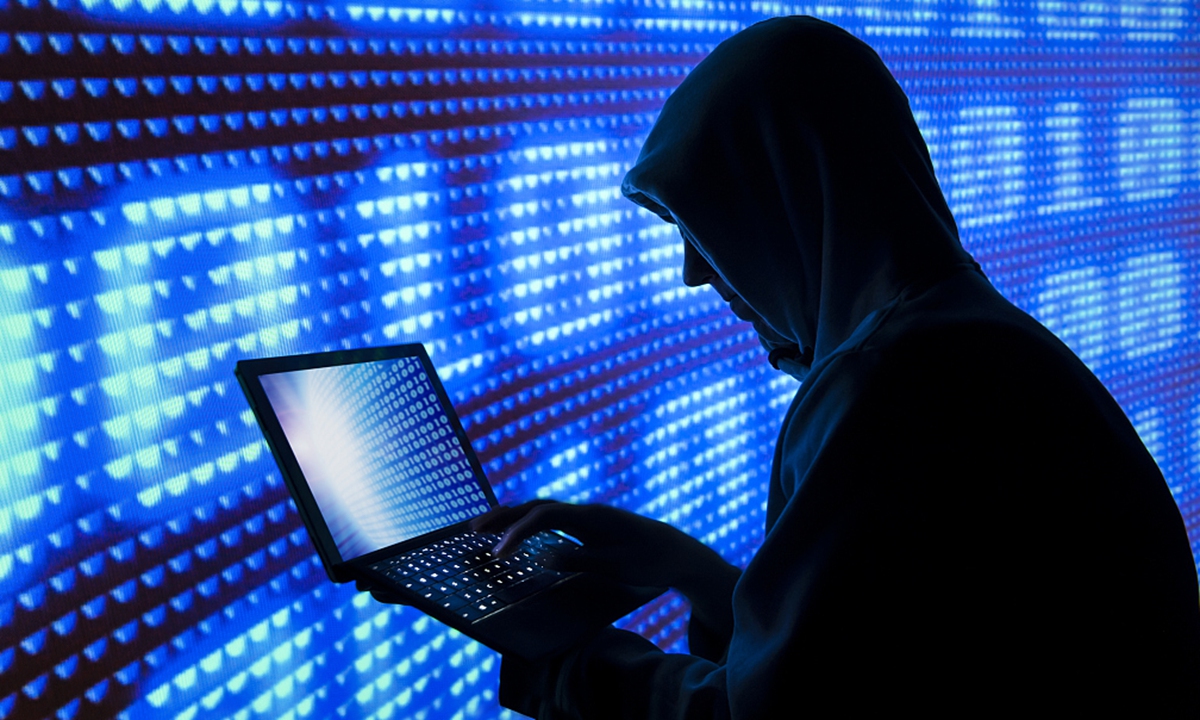Share This
Sunday, June 19, 2022
China Launches High-Tech Aircraft Carrier Fujian in Naval Milestone; Buy Huawei P40 5G and Forget Apple 12.
An empire of lies
An empire of lies
Experts noted that the US employed "white", "black" and "gray" propaganda, and the latter two are mostly carried out by agencies such as the CIA and Defense Department in a covert manner. It is estimated that 40 percent of the CIA's covert operations are propaganda programs.
Three types of propaganda
In 1951, the US government set up the Psychological Strategy Board (PSB), a committee comprised of the State Department, the Department of Defense, and the CIA. In 1953, the Operations Coordinating Board (OCB) under the command of the National Security Council was formed to further propose the US government's information and psychological warfare programs while the PSB was abolished. In 1961, former US President Kennedy abolished the OCB as it was believed that secret wars should not be publicly overseen by so many officials. Since then, the agency in charge of psychological warfare became a mystery. However, based on the analyzed related materials and US government documents, we can still have a broad understanding of how the US conducts information and psychological war abroad, Lü said. After more than a century of practice, the US formed a complete set of international communications mechanisms. That is, the NSC led inter-department cooperation, to conduct either covert or overt communications operations. They use "idealism" as a cover to achieve their "realistic" interests in their international communication disclosures. This strategic communication, to a great extent, helps maintain US global dominance, Lü noted to the Global Times. According to Lü, an important characteristic of US national and international communication is that it pursues "ideological thrust" and "weaponized information." That is to say, all the conveyed messages must serve US national strategic interests and goals. Lü listed three types of propaganda that the US adopts in its strategic communication. The "white" propaganda refers to osmotic propaganda based on the government's public activities, including public diplomacy led by the US State Department and the state-owned media represented by Voice of America. The "black" propaganda refers to propaganda activities carried out through covert action. Many propagandist activities carried out by the CIA, the Department of Defense, and other agencies fall in this category, which includes a large number of infiltration activities such as secretly controlling domestic and foreign media and buying off politicians. The CIA has a long history of manipulating media outlets worldwide for its secret propaganda purposes. According to an article in The New York Times in 1977, dozens of English and foreign language publications have been owned, subsidized, or influenced by the CIA over the past three decades. To shape world opinion, the CIA was able to call upon many news outlets in its worldwide propaganda campaign. Some of its officials admitted to The New York Times that they were concerned about the possibility of "blow-back" - that is - some of the purposely misleading or downright false information spread by the CIA abroad may be picked up by US reporters overseas and included in their dispatches to publications at home. The "gray" propaganda refers to engaging "opinion leaders" and workers in the media industry in relevant countries to act as spokespersons for US interests by means of behind-the-scenes bribes and inducements, so as to promote the interests of the US and influence the decisions of relevant governments, Lü said. According to the Los Angeles Times, in 2005, the US military secretly paid newspapers in Iraq to run stories written by US military information operations troops with help from a defense contractor to "burnish the image of the US mission in Iraq." Nearly $1,500, for instance, was paid to Addustour newspaper to run an article titled "More Money Goes to Iraq's Development." The Los Angeles Times also found out that the Pentagon had contracted a Washington-based firm named the Lincoln Group to plant these stories. The "gray propaganda" and "black propaganda" are mostly carried out by agencies including the CIA and the US Defense Department and the secrecy of these plans is hard to uncover, Lü said. Scholar Loch Johnson estimated that a full 40 percent of CIA secret operations are propaganda programs. "Whatever foreign policies or slogans the White House may be pushing" at the time, the CIA "will likely be advancing these same ideas through its covert channels," he said.
According to the 2022 Edelman Trust Barometer, only about 39 percent of American respondents said they trusted their country's government, which is nearly the lowest level ever recorded.
Related posts:
Exclusive: Report reveals how US spy agencies stole 97b global internet data, 124b phone records in just 30 days
'We lied, we cheated, we stole', ‘the Glory of American experiment’ by US Secretary of State/Ex-CIA director Mike Pompeo
Thursday, June 16, 2022
When you have insufficient magnesium, mineral for relaxation
A lack of this important mineral could be causing you health problems without you even knowing it.
As magnesium regulates neurotransmitters in the body, a lack of it can cause symptoms ranging from brain fog and anxiety to insomnia and migraines. — AFP
In the human body, magnesium is the fourth most abundant mineral. It plays a role in over 300 physiological processes. Many metabolic processes require this nutrient, as well as many other bodily functions, including the production of energy and building of proteins. Without it, your body cannot function properly. Unfortunately, the lack of magnesium is one of the most widespread deficiencies in our society today. This deficiency can drastically affect your health as it has been linked with hypertension (high blood pressure), heart disease, palpitations, and even sleep disorders.
How magnesium helps
If you have difficulty meeting your magnesium needs through food, or if you have a deficiency, then taking a magnesium supplement may be helpful. Here are some of its benefits: > Reduce blood pressure Magnesium supplements may help reduce blood pressure levels. A review of 34 studies concluded that taking around 350mg per day of magnesium for an average of three months significantly reduced systolic blood pressure (the top number for blood pressure readings) by 2mmHg and diastolic blood pressure (the bottom number) by 1.78mmHg. > Improve sleep It has been shown that magnesium supplements can greatly improve sleep in people with low magnesium levels. A review of three studies among older adults found that supplementing with 320-720mg of magnesium daily for up to eight weeks decreased the time it took them to fall asleep and increased total sleep time, compared with a placebo. > May help improve mood Depression has been linked to low levels of magnesium, leading researchers to study whether supplementing with this mineral could help treat this condition. A six-week randomised controlled trial including participants with depression found that 500mg of magnesium daily alleviated anxiety and depressive symptoms in as little as two weeks. > Help with blood sugar management Magnesium is crucial to insulin and glucose metabolism. Type 2 diabetics, who have high blood sugar, are also prone to magnesium deficiency. The reason for this is because high blood sugars and insulin levels can cause you to lose more of this nutrient through your urine. Taking magnesium supplements may help improve insulin resistance – a metabolic disorder in which your cells don’t respond to insulin properly. In a review of 25 studies, people with or at risk for type 2 diabetes who took 250-600mg of magnesium per day for up to 24 weeks experienced significant reductions in fasting and post-meal blood sugar levels, compared with the placebo group. > Reduce heart disease risk There is a link between low magnesium levels and an increased risk of heart disease. Perhaps low levels of this mineral have a negative effect on blood sugar and blood pressure, which are two risk factors for heart disease. Recent reviews of 28 studies found that taking magnesium supplements decreased blood pressure, cholesterol levels and fasting blood sugar levels in people with type 2 diabetes. > May improve migraine Magnesium deficiency has been linked to migraines – a painful condition characterised by intense, recurrent headaches. A 12-week study found that taking a daily magnesium supplement containing 600mg resulted in 42% fewer migraine attacks, coupled with less intense attacks.A lack of magnesium

Consuming enough magnesium
While magnesium is found in many foods, particularly nuts, legumes and whole grains, supplements may be beneficial to those with low magnesium intake. It isn’t always easy to choose a magnesium supplement from the wide variety of forms and dosages available. Though magnesium is easily obtained through diet alone – 400-420mg for men and 320-360mg for women – our modern diets often don’t include enough magnesium-rich foods. If you can’t get enough magnesium through your diet, consider taking a supplement. Recommended doses of magnesium supplements are 200-400mg per day, which means that a supplement can supply you with the full daily recommended intake and more. The Food and Nutrition Board of the US Institute of Medicine has determined a tolerable upper limit of 350mg per day for supplemental magnesium. You are unlikely to experience any digestive side effects if you consume supplements below this level. Some types of magnesium supplements can be absorbed more easily by your body than others. These include: Magnesium chlorideMagnesium citrate
Magnesium aspartate
Magnesium taurate
Magnesium malate
Magnesium lactate
Supplements can be delivered in a variety of forms, such as tablets, gummies, powders and liquids. In terms of absorption, the deli-very system makes little difference, provided you choose a form that is well-absorbed, such as magnesium citrate, so choose whichever form that is most convenient for you.In summary
Magnesium is essential for the proper functioning of your body. It has been reported that adequate magnesium intake reduces the risk of heart disease, diabetes and other conditions. If your diet does not provide enough of this important nutrient, you can take a supplement. It is unlikely that there will be any side effects with doses below 350mg a day. When selecting a supplement, choose one that contains a form of magnesium that is easily absorbed, such as magnesium citrate. Always discuss with your doctor or nutritionist the right type of supplements and the dosage required before you buy your supplements.Datuk Dr Nor Ashikin Mokhtar is a consultant obstetrician and gynaecologist, and a functional medicine practitioner. For further information, email starhealth@thestar.com.my. The information provided is for educational and communication purposes only, and it should not be construed as personal medical advice. Information published in this article is not intended to replace, supplant or augment a consultation with a health professional regarding the reader’s own medical care. The Star does not give any warranty on accuracy, completeness, functionality, usefulness or other assurances as to the content appearing in this column. The Star disclaims all responsibility for any losses, damage to property or personal injury suffered directly or indirectly from reliance on such information.
Related News
Injecting essential vitamins and minerals into the body
Adopting a plant-based diet has multiple benefits
Can fasting keep you looking young?
Help, I don’t have enough breast milk!
Types of long Covid, who it affects the most, and when to seek help
Magnesium: The Relaxation Mineral - VitaHealth Malaysia
- 4 key nutrients
- Boosts energy
- Supports health
CHARGE-UP™ MAG-EASE
MAL21096037NCRVitaHealth CHARGE-UPTM MAG-EASE combines highly absorbable chelated magnesium with L-theanine, vitamin B2 and coenzyme Q10 to improve wellness.
- 4 key nutrients
- Boosts energy
- Supports health
RM99.00RM79.00 60 tablets
Exclusive: Report reveals how US spy agencies stole 97b global internet data, 124b phone records in just 30 days
Photo: headquarter of NSA in Maryland
The US military and government cyber agencies have remotely stolen more than 97 billion pieces of global internet data and 124 billion phone records in the last 30 days, which are becoming a major source of intelligence for the US and other "Five Eyes" countries, a latest cybersecurity report showed. The report the Global Times obtained from Anzer, a cybersecurity information platform, on Monday, once again revealed the "black hand" operations of Tailored Access Operations (TAO), the cyber warfare intelligence agency under the US National Security Agency (NSA), which has been using advanced cyberattack weapons to indiscriminately "grab" data from internet users around the world. An exclusive report published by the Global Times in May disclosed that China captured a spy tool deployed by the NSA, which is capable of lurking in a victim's computer to access sensitive information and was found to have controlled global internet equipment and stole large amounts of user information. The Trojan horse, "NOPEN," is a remote control tool for Unix/Linux computer systems. It is mainly used for stealing files, accessing systems, redirecting network communication, and viewing a target device's information. According to internal NSA documents leaked by hacking group Shadow Brokers, "NOPEN" is one of the powerful weapons used by the TAO to attack and steal secrets. Anzer's report revealed another weapon platform, "boundless informant," which is the NSA's exclusive big data summary analysis and data visualization tool system capable of colleting, managing and analyzing data around the world illegally obtained by NSA's remote control system. According to terminal screenshots from the platform, the NSA has remotely stolen more than 97 billion pieces of global internet data and 124 billion phone records in the last 30 days. A cybersecurity analyst told the Global Times on condition of anonymity on Monday that TAO is the largest and most important part of the intelligence division of the NSA. Founded in 1998, the main responsibility of the TAO is to use the internet to secretly access insider information of its competitors, including secretly invading target countries' key information infrastructure to steal account codes, break or destroy computer security systems, monitor network traffic, steal privacy and sensitive data, and access to phone calls, emails, network communications and messages. TAO also assumes an important role. When US president issues an order to disable or destroy communications networks or information systems in other countries, TAO will provide relevant cyberattack weapons, and the attacks will be carried out by the US Cyber Warfare Command, the report revealed. According to the report, the various departments of TAO are composed of more than 1,000 active military personnel, network hackers, intelligence analysts, academics, computer hardware and software designers, and electronics engineers. The entire organizational structure consists of one "center" and four "divisions." The "center" employs more than 600 people and is responsible for receiving, sorting and summarizing account passwords and important sensitive information stolen from around the world by network information systems controlled remotely by TAO. "The NSA's global indiscriminate intrusion has long been supported by a vast and sophisticated network of weapons platforms, of which TAO is an important weapon maker. Some of these weapons are dedicated to the products of US internet giants such as Apple, Cisco and Dell, and have been developed with the support and full participation of these internet giants," the expert said. Media reports showed some US internet giants have set up a special government affairs department to cooperate with the NSA in developing cyber attack weapons and provide the NSA with special backdoors and vulnerabilities. Internal information leaked by Edward Snowden showed these weapons could be used to conduct mass traffic monitoring and hacking on any internet user around the world. According to publicly available information, most of the cyber attack weapons have already been handed over to the US and other "Five Eyes" countries. The report also showed more than 500 code names for cyber attacks and data theft operations conducted by TAO have been disclosed, which proves that the US is a developed internet country in the world, as well as a major country in cyber intelligence collection and data theft. In 2013, the US spent $52.6 billion on global intelligence gathering programs, of which two-thirds went to cyber security operations to carry out cyber attacks on foreign countries and domestic targets in the US. A large number of TAO's cyber attack weapons have also been shared with some allied countries. Media reports showed that GCHQ, the UK's security and intelligence agency, has used NSA's cyberattack weapons to conduct long-term attack control and communications monitoring in the European Union.
"The US is taking highly engineered cyber weapons as the winning advantage in future cyber warfare, and is investing resources and increasing chips regardless of cost, bringing endless hidden dangers to global cyber security," the expert said.
China has been under continuous cyber attacks since late February where attackers with internet addresses in the US ...
The Winter Olympic Games should never be a stage for political shows. Getting in the way of the ...
It's a threat to national security | The Star
https://www.thestar.com.my/opinion/letters/2022/06/14/its-a-threat-to-national-security

Related posts:
China captures powerful US NSA cyberspy tool
SOURCE: Data protection dept not doing its job
Act swiftly to prevent data breaches
Remain vigilant against financial fraud
Remain vigilant against financial fraud
Cases of bank accounts looted by dodgy apps on the rise ...
THE Association of Banks in Malaysia (ABM) would like to remind members of the public to remain vigilant at all times to safeguard personal information. This includes avoiding downloading files or applications from unverified sources onto mobile devices. ABM would like to draw the public’s attention to the safety measures recommended by the Malaysia Computer Security Response Team’s (MyCERT) security advisory, published recently. Here are some of the safeguards recommended by MyCERT: > Do not install any app or Android package kit (.apk) file from unknown sources. This is because it may be malware designed to steal your personal details and your online banking credentials. > Do not click on adware or suspicious URLs sent through messaging services. > Do not root or jailbreak your device. > Verify an application’s permission settings and the application’s author or publisher before installing it. > Only download apps from official sources. > Do install antivirus software on your devices and run it regularly. > Update your device’s operating system and apps regularly. With cybercriminals and online fraudsters constantly changing their methods, ABM would also like to urge the public to remember the following: > Never divulge your personal details and/or banking credentials to unknown or unverified parties. > Never disclose your transaction authorisation code (TAC) or personal identification number (PIN) or your online login username and password to anyone. > Never click on any links to banks’ websites that are sent from unknown, suspicious or unverified emails. Always key in your bank’s website address directly into the URL bar in your Internet browser or use your bank’s official mobile app. > Avoid websites offering products at prices that are too good to be true and are littered with spelling mistakes – these tend to be fraudulent sites. > Avoid using public or open WiFi networks for online banking. > Always ensure that the banking website or banking app that you are using is genuine and official. > Always refer to your bank’s official website or contact your bank’s hotlines (stated on the back of your credit card or on the banks’ websites) directly for information, verification and clarification when in doubt. Bank account holders are also advised to monitor your statements as well as transaction alerts from the banks closely. If you notice any unusual or suspicious transactions, contact your bank as soon as possible to report it. Next, lodge a report with the police. Thereafter, notify the bank in writing with a copy of the police report and all relevant records and documentation, such as transaction history, etc. Due investigation processes are in place to determine if the reported transaction is indeed unauthorised. ABM would like to reiterate that member banks are required to adopt high standards of security, including for Internet and mobile banking services. Routine security reviews and advisories are also issued by Bank Negara Malaysia to financial institutions to ensure adequate protection against the latest threats. The public are advised to keep informed of emerging threats through the advisories issued by financial institutions, Bank Negara Malaysia and other authorities to protect themselves. Information on the latest threats and measures that you can take to protect yourself against cybercriminals and online fraudsters can be obtained from abm.org.my/consumer-information/fraud-alerts.ASSOCIATION OF BANKS IN MALAYSIA
Related stories:
BNM steps up collaboration with banks and law enforcement ...
Public getting fed up with never ending data leaks
Your personal data on sale – cheap | The Star
Related posts:
















